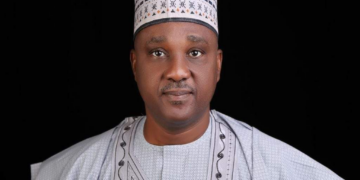Amidst rising insecurity, security stakeholders have called for well-structured community policing to address the security challenges from the grassroots.
Community policing in practice involves a collaborative approach where law enforcement and community members work together to address security issues and improve overall safety and well-being. This includes fostering trust, involving the community in decision-making, and empowering citizens to participate in crime prevention and problem-solving efforts.
This echoes the call for community engagement and ownership in the fight against insecurity by the director-general of the Department of State Services (DG DSS), Oluwatosin Adeola Ajayi, earlier this year.
Ajayi supported the call for community policing but spoke about the need for “arms control” and some form of approval and guidance.
He said, “We have to allow some level of armament for the community policing so that they can serve as the first line of defence… when we leave here, those of us who have some influence, the elite, discuss with your community es. Come to us. Get some form of approval and guidance.”
Also, former minister of defence, General TY Danjuma (retd), recently renewed his call for Nigerians to take proactive steps in defending themselves, warning that the government cannot resolve the country’s security crisis alone.
Speaking during an Easter gathering held in Takum Local Government Area of Taraba State to appreciate his employees, partners and affiliated companies, Danjuma said the rising tide of violence from bandits and terrorists demanded a collective response.
While urging citizens to adopt self-defence measures as a vital strategy in safeguarding their communities, Danjuma warned that “if our people do not stand up and defend themselves, bandits and terrorists will take over our society.”
Reacting to the current situation and the idea of community policing, an internal security analyst, Ahmed Isa, said Ajayi’s call for community-based security is in sync with global best practices.
He said this will bring about “a more inclusive, modern, and adaptive security paradigm and not a jungle-justice type of security architecture.”
According to him, it is unrealistic to expect that Nigeria’s security forces, stretched across the 36 states and over 774 local governments, can single-handedly protect every citizen, every village, and every road at all times.
The scale and flexibility of modern security threats, ranging from banditry to terrorism and cybercrime, require a broader, more grassroots approach. The DSS’s boss’s comment doesn’t signal despair but a genuine strategy that builds local resilience.
“The idea that communities should be involved in their security is not a radical dereliction of duty; it is consistent with successful models worldwide. For instance, countries like the United States of America still have federal security agencies, but have community-based policing as a complement. So, why won’t Nigeria have neighbourhood watches, local vigilante groups, and community-police partnerships that would work in villages, given that they have better knowledge of their terrain? Mr. Ajayi proposes not arming civilians with sticks but equipping communities with the intelligence, awareness, coordination, and legal backing to play a proactive role. Even when communities possess some ammunition, guidance, profiling, and authorisation are key,” he said.
Barrister Kenneth Imasuangbon, for his part, urged Nigerians to heed Danjuma’s advice and defend themselves in the face of growing insecurity and the government’s inability to provide protection.
He expressed disappointment at the state of the nation, saying: “At 59, I should be celebrating progress, not speaking on government failure. People are being killed, kidnapped, and displaced daily, yet the government appears powerless.”
General Danjuma criticised what he described as the silence and helplessness of the federal and state governments in the face of banditry, terrorism, and communal violence.
“The Nigerian state has failed in its primary responsibility to protect lives and property. When the government is silent, the people must not be silent. We must defend ourselves,” he said.
Also, the president of the Eastern Nigeria Development Association, Charles Chukwunaru, said: “There is something strange and alarming about the failed republic. The citizens of Nigeria surrendered their power to bear arms to the government under the bogus 1999 constitution in exchange for security guarantees by the government.
“Now that the government appears to have admitted its failure in this regard, as can be inferred by the trending comments of the experienced director general of the Department of State Services, constitutional reforms or restructuring, or better still, devolution of power so that community policing will become constitutional in the spirit of the only authentic 1963 constitution of the Federal Republic should be given utmost priority by the Tinubu regime.”
But a security analyst, Jonah Moses, called for caution in practising community policing in Nigeria.
He argued that such a situation could lead to anarchy if not adequately managed.
“The call for self-defence, while understandable given the horrific killings we witness daily, is practically a call for anarchy. The country would descend into chaos faster if not properly managed.
“Also, how exactly are civilians supposed to confront hardened criminals armed with sophisticated weapons? Imagine farmers with Dane guns facing bandits wielding AK-47s, AK-49s, and RPGs. That’s not self-defence; that’s suicide.”
Countries Practising Community Policing
Many countries, particularly in North America, Europe, and Asia, have embraced community policing and integrated it into their policing strategies. These include Canada, the United States, Japan, and Singapore. Some African and Indian countries are also implementing community policing approaches. Even developing countries, such as Kazakhstan, are exploring and piloting community policing models with the help of the United Nations.
How Feasible Is Community Policing In Nigeria
Community policing in Nigeria can effectively enhance safety and address security challenges, but its success is hinged on overcoming various obstacles like corruption, lack of public trust, and inadequate funding. While it shows promise as a crime prevention strategy, its implementation needs careful consideration and addressing these challenges to ensure positive outcomes,” he said.
To a former director of the Department of State Services (DSS), Barr Mike Ejiofor, establishing subnational policing is long overdue.
He noted that the country’s insecurity could not be addressed without state/community policing, especially for those areas bedevilled by threats.
“I’ve repeated time and time again – that for us to solve our current security challenges, we need the creation of the state police, and I was excited when the 36 state governors adopted it. The advantages far outweigh the disadvantages because the bulk of the personnel will be drawn from the communities/localities, and these are the people who know the environment. They know their terrain more than I do. You cannot take somebody from Maiduguri to Bauchi or Bayelsa; there is no way he’ll know the terrain there, and they cannot work in isolation. They will work with the federal police,” he said.
Ejiofor, however, cautioned that not all states can afford state police due to paucity of funds, “but for the states that can afford it, for example, states that have been seriously challenged by security issues like Borno, they are bound to establish them and they can partner with foreigners.”
However, he expressed worry that the issue of security provision has been left in the hands of the federal government alone, adding that the nation will continue to regret it if the situation persists.
“People express fear that state police will be abused, but I say no. Is the Nigerian Police, as it is now, not being abused? So if your rights are being abused, you go to court and seek redress. If the governors, because they have immunity, abuse your rights, you can go to court and seek redress. I keep saying one of the best ways to solve insecurity is the establishment of the state police.”
He reiterated that the judiciary remains the last hope of the common man.
“People have been enforcing their rights against security agencies. When it comes to issues of police involving the government, especially the federal government, it becomes a problem,” he said.
Also contributing to the discourse, the director of media and publicity, International Institute of Professional Security (IIPS), Dr. Abdullahi Muhammed Jabi, said the creation of state policing structures was a welcome development.
He, however, called for the establishment of modalities to ensure it doesn’t fall into the hands of dictatorial governors.
“We have no choice but to accept the establishment of state police and local government policing because those are the people who are closer to the people. Everybody knows everyone, their occupation and whatever they do. So if you’re a family man and your child is on drugs, everybody knows.”
They called for the deletion of the state government, describing it as a waste of resources.
“Left for me, I could have called for the cancellation of state governments and allowed two tiers of government, federal and local, so that resources can descend to end users with serious mechanisms put in place for monitoring and evaluation,” Jabi said.
On state policing, he said, “The creation of state policing is a welcome development because of our current population. The number of policemen in the country is grossly inadequate, so the shortfall accounts for the great crimes we are witnessing.”
He noted that the government had contributed directly or indirectly by not enforcing the state principle as enshrined in the constitution.
“I’m solidly an advocate of the creation of state police. We need to be able to merge the gap with the state police, and we must allow the system to work,” he said.











